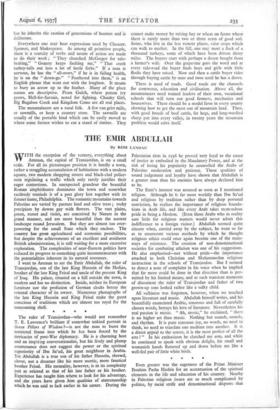The ruler of Transjordan—who would not remember T. E. Lawrence's
brilliant if somewhat unkind portrait in Seven Pillars of Wisdom ?—is not the man to burst the restricted frame into which he &Is been forced by the intricacies of post-War diplomacy. He is a charming host and an inspiring conversationalist, but his lively and plump countenance does not suggest the .power or the spiritual superiority of Ibn Sa'ud, his great neighbour in Arabia. Yet Abdullah is a true son of his father. Hussein, shrewd, clever, not .a dreamer like his more ascetic, more . fanatical brother Feisal. His mentality, however, is in its complexity just as oriental as that of his late father or his. brother. Experience has taught him where to look for his advantage, and the years have given him qualities of statesmanship whiCh he was said to lack earlier in his career. During the Palestinian riots in 1936 he proved very loyal to the cause of justice as embodied in the Mandatory Power, and at the risk of losing his popularity he counselled the Arabs of Palestine moderation and patience. These qualities of sound judgement and loyalty have shown that Abdullah is a greater man than his enemies have always declared him to be.
The Emir's interest was aroused as soon as I mentioned religion. Although he is far more worldly than Ibn Sa'ud and religious by tradition rather than by deep personal conviction, he realises the importance of religious founda- tions in Arab life, and like every Arab takes tremmdous pride in being a Moslem. (Even those Arabs who in reality care little for religious matters would never admit this indifference to a foreign visitor.) Abdullah seemed quite sincere when, carried away by the subject, he went so far as to enumerate various methods by which he thought religious ethics could once again become one of the main- stays of existence. The creation of non-denominational societies for combating atheism was one of his suggestions. He also emphasised—not without pride—the importance attached to both Christian and Muhammedan religious instruction in the schools of Transjordan. But I seemed to detect a note of complaint in his voice when he implied that far more could be done in that direction than is per- mitted by his limited means, and at such transient moments of discontent the ruler of Transjordan and father of two grown-up sons looked rather like a sulky child.
All iulkiness was forgotten, however, when we touched upon literature and music. Abdullah himself writes, and his beautifully enunciated Arabic, sonorous and full of carefully chosen Words, betrays his love of literature. Nevertheless his real passion is music. " Ah, music," he exclained, " there is no higher art than music. Nothing but sounds, sounds, and rhythm. It is pure sensuous joy, no words, no need to think,'no need to translate One medium into another. It is a direct appeal to the senses, it is the most perfect of all the arts ! " In hii enthusiasm he clutched my arm, and while he continued to speak with obvious delight, his small and womanish hands fluttered up and down before me like a well-fed pair of little white birds.






































 Previous page
Previous page